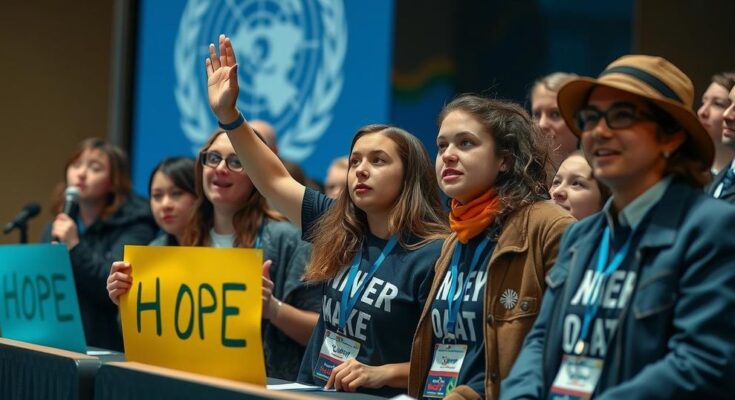Youths attending the U.N. climate talks express anger over the impacts of climate change, including personal losses and diminished opportunities. Despite their frustrations, they strive to advocate for future clarity and meaningful action. As disproportionate victims of climate crises, these young individuals assert the importance of their voices in shaping policies affecting their lives and futures.
During the recent U.N. climate talks, young individuals expressed their profound anger at the ongoing climate crisis while simultaneously striving to maintain hope for a better future. Many of these youth have suffered significant losses, including diminished educational opportunities, homes, and connections to their ancestral lands due to climate change. Despite their frustrations, they remain determined to advocate for meaningful change in international policies that affect their lives. Among the youth voices was Marinel Ubaldo, a 27-year-old from the Philippines, who shared her experiences of surviving devastating typhoons. Having witnessed the destructive impact of climate events since her teenage years, Ubaldo articulated her ongoing struggle to remain positive amidst feelings of pessimism regarding global climate negotiations. The diminished presence of leaders and the tightening of protest regulations in authoritarian contexts have compounded these sentiments of disenchantment. Felipe Paullier, the U.N.’s assistant secretary-general for youth affairs, highlighted the persistent challenge of including youth in significant decision-making processes surrounding climate discussions. Furthermore, UNICEF’s Kitty van der Heijden emphasized the urgent need to prioritize children’s well-being as they disproportionately suffer from climate-related health issues, indicating widespread failures in protecting the youngest generations. The sense of responsibility weighs heavily on youth advocates, particularly those from regions most affected by climate change, as they continue to plead for action. Fathimath Raaia Shareef from the Maldives conveyed a poignant reflection on her fears about her home country’s future due to rising sea levels, underscoring the emotional toll that climate change exerts on young individuals. Francisco Vera Manzanares of Colombia echoed similar sentiments about the credibility crises faced during these climate negotiations. He stressed that while society may listen to children, there remains a crucial difference between listening and taking actionable steps toward substantive change. Vera Manzanares advocated for greater collaboration between adults and youth to empower the latter to effectively advocate for their rights and futures amidst a climate crisis that disproportionately affects them. At these U.N. climate talks, young individuals, while expressing frustration over the slow pace of change, remain resolute in their commitment to fight for their future and the planet they inhabit. They continue to push for recognition and accountability from those in power, striving for a more equitable and sustainable world.
The U.N. climate talks, a critical platform for international climate negotiations, have witnessed increasing participation from youth advocates over recent years. Many of these young individuals face direct consequences of climate change, such as environmental degradation and displacement. Consequently, they are vocal in their demands for urgent action from world leaders. This gathering serves as a poignant stage where youth articulate their experiences and push for accountability, all while confronting the pressures of political inaction and environmental urgency.
In conclusion, the voices of young people at the U.N. climate talks reveal a complex blend of anger, frustration, and resilience. As they navigate the challenges posed by climate change and the inadequacies of political responses, these youth remain determined to advocate for their rights and future. Their experiences underscore the pressing need to integrate their perspectives into climate policy discussions, emphasizing that the future of the planet rests significantly on the actions taken today.
Original Source: www.voanews.com




